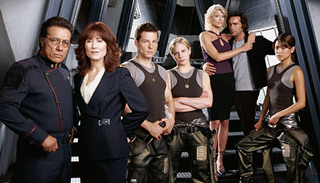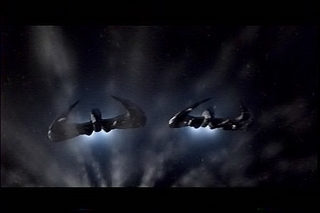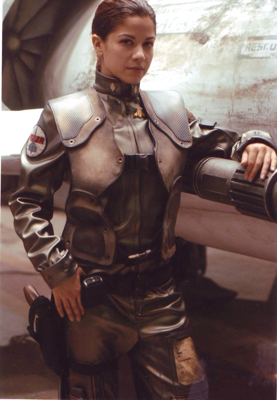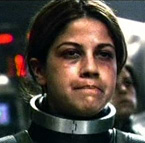Editorial: “They finally killed off Kat”: Battlestar Galactica and the Limits of its Politics

Since the SciFi Channel launched the current rendition of the series Battlestar Galactica (2003-present), I have consistently been amazed at how well it has tackled some compelling contemporary issues through the lens of a future, fantastic, world. One of the strengths of the show, and perhaps of science fiction in general, is linked to the fact that story events take place in an imaginary world, but are created and consumed in the present. As such, the story's “future” and our “now” are in consistent communication with each other, and the lengths to which audience members separate “fantasy” from “reality,” I would argue, is only as great as their desire to say “it's only entertainment” vs. “wow — I never thought of those issues that way before.”
To date, Battlestar Galactica has certainly explored significant topics, but it is remarkably silent on racial and ethnic interrelationships. In this editorial, I present some observations on this silence, while keeping in mind that Battlestar Galactica's conflicts are more likely to explore political and, at times, class differences amongst the survivors of the Cylon attacks. That Battlestar Galactica's narrative does not shy away from these discussions is one of the reasons that I and people I know watch the show. In one particularly salient set of episodes that begin Season 3 (and in the “webisodes” that lead up to the season), the audience is presented with persuasive reasons to both condemn and sympathize with suicide bombers. This example illustrates one way in which the show explicitly ties its narrative to contemporary issues, and challenges or subverts common ways of thinking about them, even calling the humans “the resistance,” with whom we are encouraged to identify against the Cylons' “occupation.”

In other ways, such as eliding differences based on race or ethnicity (“real” human constructions), the humans of Battlestar Galactica seem to be explicitly different from those in our world. The problems facing the future of humans and Cylons are often expressed in racialized terms of “us” vs. “them,” yet at no time are either humans or Cylons separated by color or trait within their particular societies. What we, the audience, may recognize as “Black” or “Asian,” or other phenotypical distinctions important in our world, seem to have no meaning in their world. In my estimation, Battlestar Galactica's not relying on racial or ethnic stereotypes is relatively “progressive,” in that humans may be understood to have moved beyond such divisiveness in the future.[1]
In terms of casting, too, especially when we consider Edward James Olmos, we can speak of “color-blind” practices, where Olmos was not “typed” or “stereotyped” and hired to play “Latino.” He is Commander, or now Admiral Adama. Bodie Olmos, Edward James Olmos' son is cast as Brendan Costanza, and also plays a role free from Latino affectations. Other characters, including Dee and Sharon, of non-white or mixed-white heritage play roles that also seem to be devoid of stereotypes brought in from “our” world to theirs. Yet, including with the characterization of Adama, the embodiment of “whiteness” (as ideology and practice — including Adama's blue contacts and the Celtic-inspired Adama family theme)[2] is favored over linguistic or other markers of difference even when actors are visibly racially “not white.” In my estimation, the largely “whitewashed” future presented by Battlestar Galactica reveals some hesitation on the show's part to truly embrace an integrated society.
What I mean by this can be illustrated in at least two ways. First, in the fact that minority representation (in terms of the cast) is far below what we know human diversity entails. This is certainly attributable to entrenched casting practices favoring whites as the majority of contract players,[3] and it is a topic I will leave to another project. Second, a closer look at the character Louanne Katraine (call sign “Kat”) and the details surrounding her death reveals an uncomfortable link with a history of racial stereotypes in U.S. media. While purging of traitors is a constant theme in Battlestar Galactica, in this case, the offenses for which Kat is eventually destroyed are too easily conflated with fears that are propagated in other media sites in the “real world.”
Markers that have traditionally marked Latinos in U.S. popular media forms are mired in stereotype, and include everything from “Hispanic” surnames to certain physical, linguistic, and cultural characteristics. These are almost entirely missing from Battlestar Galactica, almost. The characterization of Kat fits that of a hothead, recalling the tradition of the “spitfire,” who is unpredictable and “out of control.” From the outset, she's in the face of her commanders, she's likely to let her crew down or betray them, and can be seditious amongst her colleagues. She's not alone in some of these characterizations, as her main rival Kara Thrace (“Starbuck”) also can be hotheaded and prone to mouthing off. However, only once does Kat actually prove her pilot skills as superior to Starbuck's, but more often than not Starbuck (who's white) is the one who puts Kat in her place.

Ultimately, Kat's characterization relies on a “type” that is shorthand for trouble. Although Luciana Carro, the actor who plays Kat is reportedly Canadian of Italian descent (she alludes to it in an online interview with Dorinha Girls, and it's in her Wikipedia bio), within the show her demeanor along with her physical characteristics conflate with stereotypes of the spicy and streetwise Latina. While anecdotal, out of curiousity I've brought up the topic of “the Latina character” in circles discussing the show, and people don't require elaboration to know of whom I speak. Furthermore, in the “About Me” section on Dorinha Girls's site, Luciana reveals:
What's the most common question that people ask you?
“Are you spanish?” [sic]
What do you want the world to know about you?
I'm not.
This conflation of her appearance with a common ethnic character type facilitates her characterization and shortens the amount of backstory necessary to “know” what type of person Kat is. While understandably Louanne doesn't want confusion about what she “is,” as an actor she can become Kat, and Kat's characterization follows its own rules subject to the constraints of the show.[4]
I'm not claiming that the writers or actors, etc., have intentionally propagated racist patterns, but rather that the patterns in play can be interpreted within a history of stereotyping “others” within the dominant culture that has linked certain traits with certain phenotypes consistently enough that the shorthand chosen for the character Kat “works” without much if any complication. As mentioned above, the trait of “feistiness” (or even the “hothead” rebel) is not limited to Kat, but is also associated with others including Starbuck. What is not linked to others is Kat's abuse of drugs (although substance abuse is rampant amongst the crew, they partake in the more socially sanctioned alcohol and tobacco), and even more strikingly, in a recent episode, Kat is exposed as a traitor to the nation. More specifically, she's revealed as an imposter who took on the name Louanne Katraine to hide a past in which she ran contraband. In effect, Kat's status within the survivor community is, in contemporary terms “illegal.” Her identity is linked to “border crosser,” and Starbuck even accuses her of trafficking the Cylons back into contact with humans. Kat's sins, when added to other typing elements, “fit” a pervasive stereotype of the Latina in dominant media.

Kat is, in other words, a danger that must be eliminated. Not only that, but to prove her worth once Starbuck threatens to expose her lies, Kat chooses to sacrifice herself presumably to help save the other survivors, but also probably so that she doesn't have to disgrace and rejection by the rest of the crew. While I don't believe that media is responsible for all cultural learning, media and also genre can be used to expand, challenge, or reify the views of the world we each have constructed. Genre theories often point to the ways that formulae reduce complexities raised within narratives in order to provide easy closer to complicated issues, placating the audience with a triumphant ending by ignoring that it's not “that simple” in real life. One way to do this is to eliminate the threat, and when it's a person, that person dies. By eliminating all possible continuations of that threat's storyline, there is no longer any need for people to concern themselves with it. When you kill off Kat, you kill off the possibilities of exploring the issues inherent in her past, present, and future. Starbuck, Adama, and everybody else, don't really have to choose whether or not (or how to) accept Kat, because she's gone. I know I'm not the only one who has been waiting for the show to purge this character.[5] In fact, I was pleasantly surprised she lasted as long as she did and hoped against hope she'd stay longer, without becoming trapped in such a character turn.
The ending of the episode is powerful, in which both Starbuck and Adama praise Kat for her sacrifice, and her status as outcast is revoked through Adama when he treats her as if a daughter.[6] But the truth is, we (the audience) can't really know how it would have gone if she had lived. The character arc might have provided a means by which to consider more completely Kat's background, who she was and why she chose to change, perhaps even flipping identification more completely to empathize with her instead of against her for her past. Instead, while she is nominally forgiven, it is without explanation or even penance beyond her suicide/sacrifice, and therefore without the chance for true redemption and forgiveness from all her peers.

My challenge to this show, which has complicated the dynamics of terrorism (colonized/colonizer, occupation/resistance, terrorist/freedom fighter) deftly through allegories that link story “fantasy” with our “reality,” is to apply similar tactics to issues of race and ethnicity.
Notes
[1] In this sense, the idea of the “human race” as one race is taken for granted in the diegesis of Battlestar Galactica, in contrast to the “real” world where race has been maintained as a divisive category despite the fact that it is a social construct without basis in genetic science.
[2] I want to be clear here that I am not criticizing Edward James Olmos for not “acting” Latino. Anyone familiar with his work and life knows that he is a leading advocate for social change with respect to minority rights, education, opportunity, representation, etc….
[3] Among other resources, the National Association of Latino Independent Producers (NALIP) and Julio Martinez of Latin Heat keeps an eye on these trends. See for example Martinez's articles “The Series Regular Count” and more recently “Cable TV Fall Season Uncharacteristically Latino Thin.” Also perhaps of interest: a recent article online on Backstage detailing a UCLA report about recourses minorities may take for greater representation in media.
[4] An actress of Italian descent playing a “Latin” character suggests that Italian/”Latin” actors and roles continue to be interchangeable in U.S. media.
[5] The title of this article includes a telling quote from the Tv.Com episode reviews for the episode in which Kat dies, entitled “The Passage” (Season 3, Episode 10).
[6] This is a moment ripe for further commentary. What happens if we interpret this scene through the star identity of Edward James Olmos (instead of through the character of Adama)? I would argue that it's difficult to ever watch the show without “seeing” Olmos as much or more than we “see” Adama. If we are inclined to read Kat as Latina, and Olmos the star as Latino, then I would argue his forgiveness and acceptance of Kat has much greater meaning, beyond the limits of the program itself.
Image Credits:
1. Battlestar Galactica cast photo
2. Cylon Raiders
3. Episode 2.15, “Scar”
4. Kat publicity still
5. Episode 3.10, “The Passage”
Please feel free to comment.
Off base.
This article is taken way too far. SUch a stretch.
Okay…but race still matters.
When I was writing, I fully expected this response, “it’s a stretch.” I’ll grant that perhaps it is.
However, I can’t, given the history of race and representation in our country, not think about these issues when I watch the show. I love the show, but the casting and narrative trajectories related to racialized bodies makes me wonder, why?? If it’s science fiction and anything is possible, why does it “make sense” to cast certain actors and write their narratives in some of the ways that the show has chosen to do?
Why does the most visible “Asian” actor play a Cylon? She’s phenomenal, but where are other prominent “Asians” playing other types of roles?
Why does the most visible “black” actor play a Cylon? And really, he could have more prominence–he’s faded into the background since Starbuck escaped from him.
Why did the most visible “black” woman, with a much darker skin tone than Dee, have to play the priestess, and why did she have to die? And where are black bodies period?
I put the races into quotes here because they are, again, our cultural constructs, not the show’s. Yet our cultural constructs and casting practices inform this fantasy world. The study cited in the article from Backstage (mentioned in note 3 above) reports that 69% of roles surveyed in Hollywood in 2006 were reserved for white actors. And if you consider reports elsewhere, the ratio of white to minority actors is even poorer if you look at how many *leading* roles are reserved for white actors.
If you want a challenge, peruse promo pictures for Battlestar Galactica, and try to find actors of color. It took me a really long time to find pictures of Kat/Luciana, and the best ones of Luciana as Kat were on Luciana’s homepage.
This is why, even if you don’t buy my argument about Kat, I believe there’s more to be said about race in media than just, “it’s entertainment, leave it alone.”
What about Hera?
Thanks for the provocative BSG column, Jean!
One comment and one question. First, when Starbuck criticizes Kat for her former life as a contraband runner I was immediately reminded of a recent PSA campaign that conflates casual illicit drug use with domestic terrorism. One such PSA is available here: http://www.youtube.com/watch?v=dHf0DG966dw
Second, I know it’s slightly off topic, but I was wondering how you thought Sharon and Helo’s Human-Cylon child complicates the show’s handling of race? Yes, the show is silent on the racial differences between the two officers (Helo is white and Sharon non-white), but so much of the dramatic action is built around the promise/threat of their hybrid offspring. It seems to me that by merely existing, Hera, their child, threatens and/or promises to collapse many of the show’s key “essentializing” binaries (e.g., patriot/terrorist, human/cylon, organic/robot, colonized/colonizer). In your estimation, is BSG read as potentially progressive (at least in part) because the child’s survival suggests that Humans and Cylons might be able to overcome their own social divisions, even as the show’s narrative strategies rely on the constructed racial differences of our own world to make its dramatic action sensible and palpable?
Actually, Tahmoh Penikett, who plays Helo, is part Native American–his mother is a member of the Dene nation in the Yukon Territory. Not that it changes your point, Matt, just an FYI.
Also, Jean, your point could be taken back to the miniseries–before they even introduced that cute little girl on the conservatory ship, it was clear to the savvy sci-fi viewer that the ship was a goner, as its captain was the first black man seen in a speaking role.
it was a cheap stunt to kill of kat , you rich directors, etc, ruined the most creative show on the air, and you all should be fired, even if kat came back as a machine, it would be another cheap ploy, you sucked in your choices, and you know were all mad as “H”, and that bad decision to resort to killing off a main charactor, does not improve the quality of the show, it in fact, ruins the entire SHOW, no matter what you have in plans for the final episode, it was cheap, like, we have no more creativity, so lets go kill someone every watcher loves to get this reaction , the real response is, and im a sociologist, took battlestar g, down to a b movie, to be forgotten in a year, you guys messed up, and the f world would apply here, you all need new jobs, your ruined the best show in years on tv, by resorting to killing off a wonderful gusty women, i should have seen it when you all killed off “sena”, director, producter, writers, you all need a new job in a where you THINK THINK THINK about the stupid consequences of your stupid, decision, time for me to turn off sci fi, killing off a main charactor is a cheap ploy, just to upset us all, its a cheap ploy when creativity has ‘LEFT THE BUILDING.’ frankly, it reminds me how low LOST has sucked, down in the mud, with no ideas.good bye sci fi, good by creativity
I agree that there’s a certain double-bind to BSG’s choices about representing race: while its egalitarianism and “color-blind” multiethnic cast is in some ways progressive, it can’t prevent stereotypes from resurfacing in any number of overdetermined ways in the mise-en-scene. Denying this axis of difference any narrative basis means losing an opportunity to work with this signifying excess explicitly.
It’s all part and parcel of mobilizing the Cylons’ “technicity” to stand in for all forms of otherness, which then tend to blend together in both interesting and troubling ways. I don’t think it’s a coincidence that Kat was also popular among fans for her presumptive queerness, and thus also plays into the trope that the lesbian sidekick must die.
Kat sucks. I’m glad she died. That’s what you do with the garbage; you toss it out. And she does’t suck because she looks Hispanic. She sucks because sh’s a big egotistical blob of annoying. Kara was the superior pilot and the superior character. Kat can eat it!
You know that the actress who played Kat (Luciana Carro) is Italian, right?
Ah, you mention that. Never mind.
I’m with mesonto: This seems a pretty far stretch to me.
Thank you for your thoughtful analysis. I just started watching BG. I absolutely agree with you. They missed a wonderful opportunity to take her character beyond a one-dimensional stereotype. Yes, I thought that she was Latina.
Instead of allowing Kat to develop and to give muscles, blood and skin to the skeleton of her character they killed her off.
The conflict btw Starbuck and Kat seemed forced…
Funny how you didn’t mention that Admiral Adama (Edward James Olmos) is hispanic.
I’m really enjoying the design and layout of your website. It’s a very easy on the eyes which makes it much more pleasant for me
to come here and visit more often. Did you hire out a designer to create your theme?
Outstanding work!
Idiot.
I was simply trying to find out why Kat’s character was killed-off. Did the actress not have a contract as was the case with Season One actors and was committed to another role as the case with Billy? What was the reason?
I respect the passionate views of everyone however I wasn’t looking for a debate site.
Until reading this article, I never once thought of Kat as Hispanic, Latino, Latina or anything like that. I assumed she was supposed to be a standard New Jersey trope.
In any case, my thoughts were less on her race and more on “wow, what a brave sacrifice. ” I do get what you’re saying though, this show is very progressive in some ways, but I isn’t perfect
What nonsense.
This. This is how we get our racially-charged society.
By having people like this ‘writer’ to go on and on about how everything is not only racist but about race.
You, OP, you are the racist here.
Everytime ai read an article complaining about lack of racial representatiin when the casr is diverse I dont understand. How do you exactly act latino, black, adian, or whatever. When I see commercials today they are racially diverse even leaning to more poc but in all forms the commercials could be casted by any race so it begs the question is it how exactly do you “Act like a race?” You can act gay. So actors act out stereotypes they see in popular music and entertainment. Im white, many of my friends are not but We all pretty much live and act under the same bubble. Maybe its food. Thought??